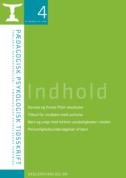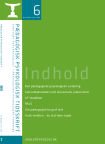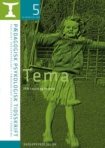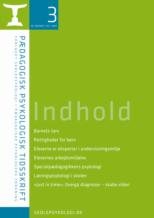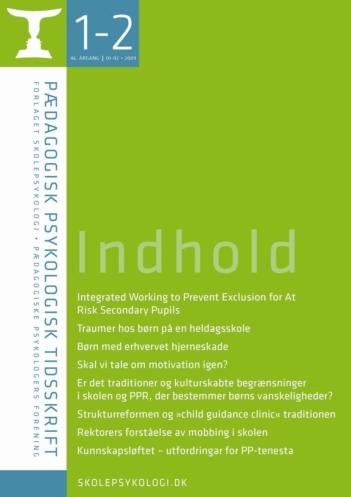Beskrivelse
Andersen; Frank, Ørsted (lecturer at The School of Education, The University of Århus). Danish and Finnish PISA Results in a Comparative, Qualitative Perspective. Pædagogisk Psykologisk Tidsskrift, 2009, Vol. 46, 203-221. – The article is based on a recently approved Ph.D.-project, aimed at answering the question why Finnish pupils perform so well in PISA. A number of common features of education in the Nordic countries are presented. One unique feature is the comprehensive school, not found in e.g. Germany, Denmark’s other neighbor. The Finnish educational system contains several favorable features within teacher education, school management, teaching conditions, and teacher assistants. Classrooms, furniture, school meals, and teaching materials are also thought to be favorable. While one cannot just copy such features, they certainly can be inspirational. – Bjørn Glæsel.
Tømming; Maiken, Agger (School psychologist in Gentofte). Small Children With Autism in Gentofte – an Attempt to Include. Pædagogisk Psykologisk Tidsskrift, 2009, Vol. 46, 222-227. – A year ago the first child with autism was included in the Baunegården kindergarten, which has 60 children divided in three groups. The aim is to place a group of six children with disturbances within the autism specter as an included part. Important prerequisites were courses for the staff, and parent education. – Bjørn Glæsel.
Lausten, Helen (Ph.D.-stipendiate at The School of Education, The University of Århus). Results from the Efficacy Study of the Efforts towards Children and Youngsters with Minor Special Needs in the Danish School. Pædagogisk Psykologisk Tidsskrift, 2009, Vol. 46, 228-245. – The first results from a large, multifaceted study of special education are presented. This study covered 889 pupils from forms 3-6 at four schools. 95 pupils had minor special needs. The features studied were: kind of problem, kind of special support (e.g. in class/outside of class, before/within/after normal school hours etc.). The data were: interviews with teachers and pupils, classroom observations, Aschenbach assessments from parents, pupils, and teachers, and CORS answered by pupils. Among the important results are: special support as a supplement to normal teaching is seen as favorable, and it is recommended that special support is flexible as to contents, methods, and amount. School psychologists should prioritize their cooperation with schools about the didactical aspects of inclusion. The pupil interviews contain three main wishes: that parents are more supportive, that classmates are less noisy, and that they themselves are more attentive to teachers, and that they engage themselves more. – Bjørn Glæsel.
Hart, Susan (Neuropsychologist). Personality Investigations of Children Based on a Neuro-affective Model of Development. Pædagogisk Psykologisk Tidsskrift, 2009, Vol. 46, 246-281. – A very detailed analysis of the development of the mental organization of children from age 2 mths.-12 ys. is presented. A number of tests and observations suited to each age stage are suggested. There is a great need to renew the ways in which behavior problems and personality dysfunctions are tested in the light of the most recent research findings. The human brain is »designed« to mature in correspondence with other human nerve systems and need optimal support through affective regulation from a more mature nerve system in order to develop optimally. It is hoped that more easily obtainable tests based on these concepts will be developed. – Bjørn Glæsel.
